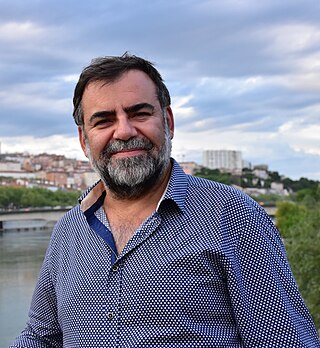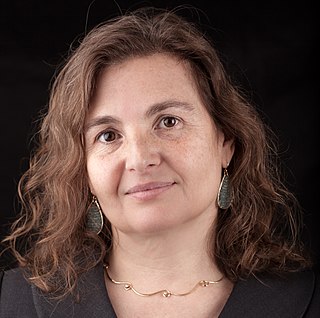Related Research Articles

New Jersey Institute of Technology (NJIT) is a public research university in Newark, New Jersey, with a graduate-degree-granting satellite campus in Jersey City. Founded in 1881 with the support of local industrialists and inventors especially Edward Weston, NJIT opened as Newark Technical School (NTS) in 1885 with 88 students. As of fall 2022 the university enrolls 12,332 students from 92 countries, about 2,500 of whom live on its main campus in Newark's University Heights district.

David A. Bader is a Distinguished Professor and Director of the Institute for Data Science at the New Jersey Institute of Technology. Previously, he served as the Chair of the Georgia Institute of Technology School of Computational Science & Engineering, where he was also a founding professor, and the executive director of High-Performance Computing at the Georgia Tech College of Computing. In 2007, he was named the first director of the Sony Toshiba IBM Center of Competence for the Cell Processor at Georgia Tech.

Ricardo A. Baeza-Yates is a Chilean-Catalan-American computer scientist that currently is the Director of Research of the Institute for Experiential AI at Northeastern University in the Silicon Valley campus. He is also part-time professor at Universitat Pompeu Fabra in Barcelona and Universidad de Chile in Santiago. He is an expert member of the Global Partnership on Artificial Intelligence, a member of the Association for Computing Machinery's US Technology Policy Committee as well as IEEE's Ethics Committee.

Willy Susilo is an Australian cybersecurity scientist and cryptographer. He is a Distinguished Professor at the School of Computing and Information Technology, Faculty of Engineering and Information Sciences University of Wollongong, Australia.

Nils John Nilsson was an American computer scientist. He was one of the founding researchers in the discipline of artificial intelligence. He was the first Kumagai Professor of Engineering in computer science at Stanford University from 1991 until his retirement. He is particularly known for his contributions to search, planning, knowledge representation, and robotics.

Daniela L. Rus is a roboticist and computer scientist, Director of the MIT Computer Science and Artificial Intelligence Laboratory (CSAIL), and the Andrew and Erna Viterbi Professor in the Department of Electrical Engineering and Computer Science (EECS) at the Massachusetts Institute of Technology. She is the author of the books Computing the Future and The Heart and the Chip.

Moshe Kam is an American Israeli electrical engineer. He is an engineering educator serving as Distinguished Professor and Dean of the Newark College of Engineering at the New Jersey Institute of Technology. Until August 2014 he served as the Robert G. Quinn Professor and department head of electrical and computer engineering at Drexel University. In 2011, he served concurrently as the 49th president and CEO of IEEE. Earlier he was IEEE's vice president for educational activities (2005–2007) and IEEE's representative director to the accreditation body ABET. Kam is known for his studies of decision fusion and distributed detection, which focus on computationally feasible fusion rules for multi-sensor systems.

Fei-Fei Li is a China-born American computer scientist, known for establishing ImageNet, the dataset that enabled rapid advances in computer vision in the 2010s. She is the Sequoia Capital professor of computer science at Stanford University and former board director at Twitter. Li is a co-director of the Stanford Institute for Human-Centered Artificial Intelligence and a co-director of the Stanford Vision and Learning Lab. She served as the director of the Stanford Artificial Intelligence Laboratory from 2013 to 2018.

Eric Poe Xing is an American computer scientist whose research spans machine learning, computational biology, and statistical methodology. Xing is founding President of the world’s first artificial intelligence university, Mohamed bin Zayed University of Artificial Intelligence (MBZUAI).

David Atienza Alonso is a Spanish/Swiss scientist in the disciplines of computer and electrical engineering. His research focuses on hardware‐software co‐design and management for energy‐efficient and thermal-aware computing systems, always starting from a system‐level perspective to the actual electronic design. He is a full professor of electrical and computer engineering at the Swiss Federal Institute of Technology in Lausanne (EPFL) and the head of the Embedded Systems Laboratory (ESL). He is an IEEE Fellow (2016), and an ACM Fellow (2022).
Animashree (Anima) Anandkumar is the Bren Professor of Computing at California Institute of Technology. Previously, she was a senior director of Machine Learning research at NVIDIA and a principal scientist at Amazon Web Services. Her research considers tensor-algebraic methods, deep learning and non-convex problems.
Rediet Abebe is an Ethiopian computer scientist working in algorithms and artificial intelligence. She is an assistant professor of computer science at the University of California, Berkeley. Previously, she was a Junior Fellow at the Harvard Society of Fellows.

Baruch M. Schieber is a Professor of the Department of Computer Science at the New Jersey Institute of Technology (NJIT) and Director of the Institute for Future Technologies.
Lynne Edwards Parker is Associate Vice Chancellor and Director of the AI Tennessee Initiative at the University of Tennessee. Previously, she was Deputy United States Chief Technology Officer and Founding Director of the National Artificial Intelligence Initiative Office at the United States' White House Office of Science and Technology Policy. She is an American roboticist specializing in multi-robot systems, swarm robotics, and distributed artificial intelligence.
Yixin Chen is a computer scientist, academic, and author. He is a professor of computer science and engineering at Washington University in St. Louis.
Dinesh Verma FREng is an Indian-born American computer scientist. He is an IBM Fellow working at IBM Thomas J Watson Research Center, Yorktown Heights, NY where he conducts research on technologies at the intersection of the Internet of Things, Artificial Intelligence and Distributed Systems. He concurrently serves as the Technical Committee Chair/Chief Technology Officer of Enterprise Neurosystems Group, an open-source consortium focused on distributed enterprise AI.
Ai-Chun Pang is a Taiwanese computer scientist specializing in mobile networks, edge computing, and the artificial intelligence of things. She is a professor in the Department of Computer Science and Information Engineering of National Taiwan University.

Nitesh V. Chawla is a computer scientist and data scientist currently serving as the Frank M. Freimann Professor of Computer Science and Engineering at the University of Notre Dame. He is the Founding Director of the Lucy Family Institute for Data & Society. Chawla's research expertise lies in machine learning, data science, and network science. He is also the co-founder of Aunalytics, a data science software and cloud computing company. Chawla is a Fellow of the American Association for the Advancement of Sciences (AAAS), Association for Computing Machinery (ACM), a Fellow of the Association for the Advancement of Artificial Intelligence, a Fellow of the Asia Pacific Artificial Intelligence Association, and a Fellow of the Institute of Electrical and Electronics Engineers (IEEE). He has received multiple awards, including the 1st Source Bank Commercialization Award in 2017, Outstanding Teaching Award (twice), IEEE CIS Early Career Award, National Academy of Engineering New Faculty Award, and the IBM Big Data Award in 2013. One of Chawla's most recognized publications, with a citation count of over 25,000, is the research paper titled "SMOTE: Synthetic Minority Over-sampling Technique." Chawla's research has garnered a citation count of over 62,000 and an H-index of 80.
Houbing Herbert Song (FIEEE) is the Director of the Security and Optimization for Networked Globe Laboratory at the University of Maryland, Baltimore County in Baltimore, USA. He received a Ph.D. degree in Electrical Engineering from the University of Virginia in 2012.
Nikola Kirilov Kasabov also known as Nikola Kirilov Kassabov is a Bulgarian and New Zealand computer scientist, academic and author. He is a professor emeritus of Knowledge Engineering at Auckland University of Technology, Founding Director of the Knowledge Engineering and Discovery Research Institute (KEDRI), George Moore Chair of Data Analytics at Ulster University, as well as visiting professor at both the Institute for Information and Communication Technologies (IICT) at the Bulgarian Academy of Sciences and Dalian University in China. He is also the Founder and Director of Knowledge Engineering Consulting.
References
- 1 2 "Grace Wang", Faculty, New Jersey Institute of Technology, retrieved 2023-04-23
- ↑ "People: Members and collaborators", Center for AI Research, New Jersey Institute of Technology, retrieved 2023-04-23
- 1 2 Koblentz, Evan (December 17, 2021), Algorithms Expert is First Woman at NJIT to Become IEEE Fellow, New Jersey Institute of Technology, retrieved 2023-04-23
- ↑ 2022 Newly Elevated Fellows (PDF), IEEE, retrieved 2023-04-23
- ↑ Fellows, Asia-Pacific Artificial Intelligence Association, retrieved 2023-04-23